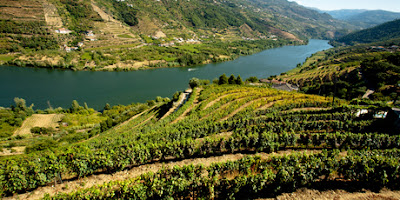[from http://www.nzherald.co.nz/lifestyle/news/article.cfm?c_id=6&objectid=10899775]
It can be a struggle to match wine with robust cheeses, strong dark chocolate or heavily infused coffee desserts. The delicate balance of most table wines, white or red, are overwhelmed by strident flavours that leave no room for compromise.
Fortunately, there is a reliable fallback position: port. With powerful primary fruit, reasonably strident alcohol levels and a warm lubricating viscosity, this ancient fortified wine is also a pleasant digestif and can be served, lightly chilled, as an aperitif.
Port is enjoying something of a renaissance and is no longer seen as unfashionable and belonging only in the dark mahogany recesses of old "Men Only" clubs.
Portugal, in particular the northern Douro Valley, is regarded as the spiritual home of this unique wine that is usually layered with warm sweet Christmas cake type flavours and should be gently sipped rather than quaffed.
One of Portugal's great ports is Quinta da Romaneira, which dates back to Roman times when vines were cultivated. Records exist of wines being produced in the 17th and 18th centuries. In 1872, auction house Christie's auctioned ports from Romaneira, the first of its kind to be sold in this way.
Romaniera's managing director, Christian Seely, is committed to making wines that are world-class and get the recognition he feels they deserve - and not just for fortified wines.
"Our challenge has been, and remains, to find ways to vinify unfortified wines from the Douro that can take their rightful place among the great wines of the world, alongside the other great classic regions such as Bordeaux, Burgundy or the Rhone Valley."
In the meantime, he will continue producing the highest quality port wine possible - vintage ports, unfiltered LBVs (late-bottled vintage) and 10-year-old and 40-year-old tawnies.
Nothing beats a glass of port in front of a roaring fire in the middle of winter.



